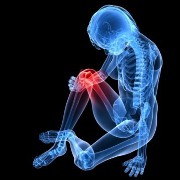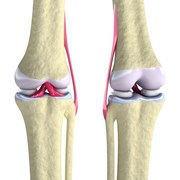 Photo: Getty Images
Photo: Getty Images
What is chondroitin?
Chondroitin is a substance that occurs naturally in the body. It is a significant building block for cartilage, which is the tough connective tissue that cushions the joints. You’ve encountered cartilage if you’ve ever torn apart a chicken wing and chewed on the soft but somewhat crunchy material on the ends of the bones. Chondroitin is an important molecule found in cartilage that helps cartilage stay strong and healthy by helping absorb fluids including water into the cartilage. It also works to block enzymes in the body that can cause cartilage to break down. The body uses chondroitin to make new cartilage to repair damage that occurs as joints move.
Cartilage is important because it separates the ends of bones in a joint and keeps them from grinding together. Over time, cartilage often gets thin and worn down. This can cause pain when the joint moves. Osteoarthritis (OA) is a condition that causes the breakdown of cartilage. It can cause joint pain, swelling in the joints, and can make the joints twist so that the fingers and hands may look deformed.
How chondroitin works
Because chondroitin is an important building block used by the body to rebuild cartilage, science has suggested that supplementing with chondroitin can help improve or prevent osteoarthritis. It is suggested that providing the body with a bigger supply of chondroitin will help it repair damaged cartilage.
Chondroitin has been researched in a variety of scientific studies. Some studies showed that chondroitin can reduce pain from OA, improve joint function in patients with OA in the knee or hip, and reduce joint swelling and stiffness. Other studies did not reveal any real benefits from taking chondroitin alone or in combination with glucosamine. In particular, science has not proven that chondroitin supplements can help delay loss of cartilage or help the body produce new cartilage.
Many studies do support the chondroitin’s ability to reduce pain, which may allow patients to take less pain medication. This is beneficial since large doses of nonsteroidal anti-inflammatory drugs (NSAIDs) can have serious side effects including bleeding in the stomach.
Overall, scientific studies to date do not conclusively show that taking chondroitin has any beneficial effect. Many patients using the supplements would disagree with that assessment.
Adding chondroitin
Chondroitin is not found naturally in any foods. The only way to add chondroitin is to take it as a supplement as a capsule or tablet. Chondroitin is usually sold as chondroitin sulfate. It is often combined with glucosamine and sometimes with manganese. Most chondroitin in supplements is made from the cartilage of cows or sharks. If you are a vegetarian, you can find chondroitin supplements that are made from algae.
While glucosamine and chondroitin have few if any side effects, it is possible to get too much manganese from a combined supplement. Manganese doses should be no more than 11 mg per day. Some combined supplements have more manganese than is considered safe. Be careful to read the label and choose a supplement that has a safe level of manganese. A standard dose of chondroitin is 400 mg three times per day or 600 mg two times a day for a total of 1200 mg each day.
Chondroitin is used for treating the symptoms of osteoarthritis, which is an adult condition. Chondroitin has not been tested for safety in children and should not be given to children.
Possible Drug interactions
Be sure to talk to your doctor if you are taking any other medications before you start taking chondroitin supplements. Be sure to discuss these possible interactions:
• Blood thinners (anticoagulants) – Chondroitin may enhance the effects of blood thinners which could make your blood too thin. Your doctor might need to adjust the amount of blood thinners you are taking if you begin taking chondroitin. Some other supplements including fish oil and vitamin E can also act as blood thinners and may interact with chondroitin in this way.
• NSAIDS (nonsteroidal anti-inflammatory drugs) – Since chondroitin relieves some of the pain of OA for some patients, your doctor may be able to reduce your pain medication dosage if you are start taking chondroitin. Talk to your doctor and keep track of your pain levels before making any changes to your pain medications. It can take several months for chondroitin to begin to reduce OA pain.
Sources:
About.com: Orthopedics
University of Maryland Medical Center
American Academy of Orthopaedic Surgeons
Arthritis Foundation






Add a CommentComments
There are no comments yet. Be the first one and get the conversation started!